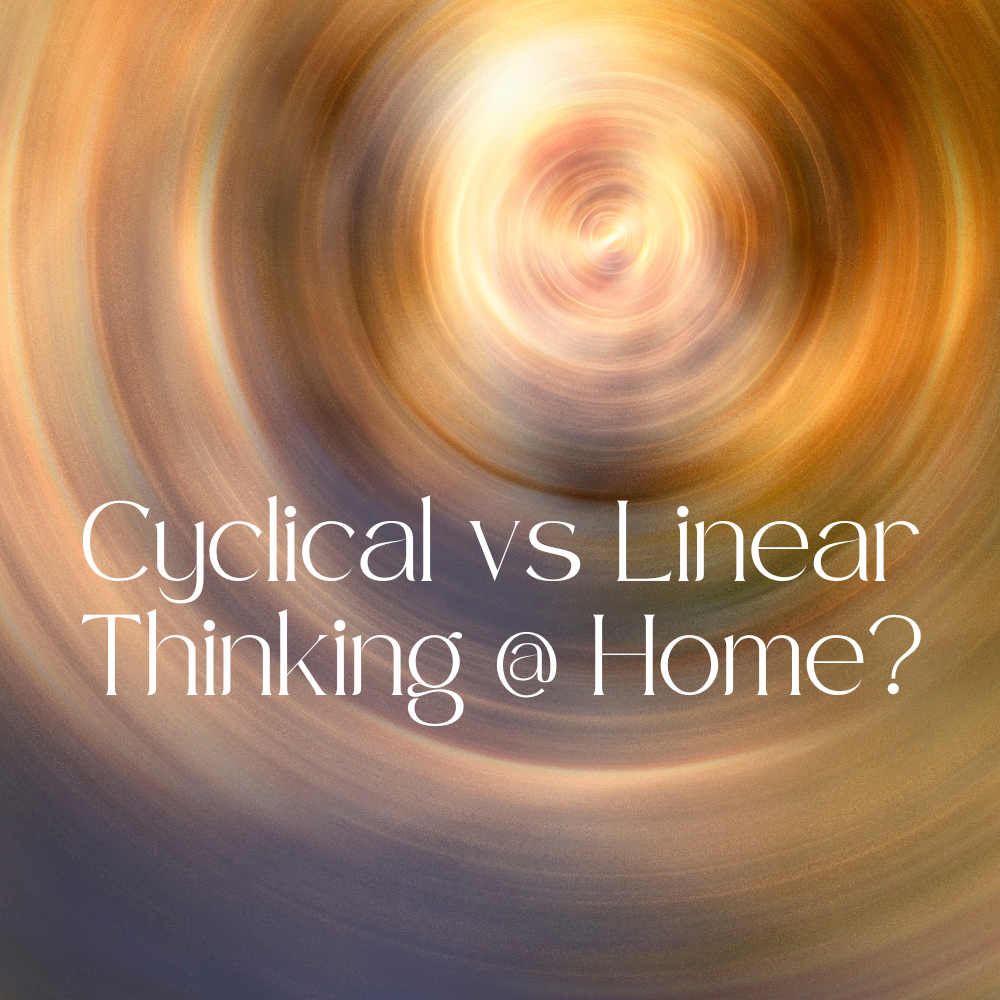A client recently shared with me that their life feels so chaotic right now due to all of the clutter and endless laundry. It reminded me of three years ago when I left full-time work to be the primary caregiver at home. I was complaining to my friend about all the laundry, and she shared a phrase that her friend once told her…"Laundry is life."
I hated this phrase, as it felt like it meant that my life was now filled with only doing other people's laundry. What kind of progress can be made when you are just doing the same thing over and over again?
Three years ago, I was so used to thinking in a linear model of time due to my career in leadership...one that had activities with clear entry and exit points, a clear start and finish, an objective and an accomplished goal. Having a role with no goal/endpoint/exit was unthinkable and I was frustrated by the constant two steps forward and one step back. It wasn't until this past January (TWO whole years later!) that I realized I was thinking about it all wrong.
In the US, we value the linear model of time. “Time = Progress” And if progress isn’t made over the course of time, then you fail. Well, what does that say about laundry then? There’s been progress over time in that we started with beating dirty clothes over river rocks, eventually moved to a manual wringing device, and now have a fancy washing machine that requires just the press of a button. But we aren’t yet living in the age of the Jetsons and still need to fold the laundry and put it away only for clean clothes to be pulled out of kids’ drawers and tossed on the ground (which btw has been happening since the beginning of time). My point being is that whether we like it or not, somebody has to do the laundry every week of every month of every year until the end of time. But why did that seem like such a bad thing to me three years ago?
So much of caregiving is doing the same thing every day over and over again…getting kids to wake up, reminding them to get their clothes on, making breakfast, reminding them to get their clothes on, getting snacks and lunches ready, reminding them to get their clothes on, and so on and so forth. Caregiving works in cycles and is not linear.
In many Indigenous and Eastern traditions, time is looked at in a circular concept or cyclical model. Energy moves in repeated patterns - ice melts to water which turns to vapor and so on. Same goes for caregiving. You exert energy to care for another human, that human grows…rinse and repeat over and over and over again.
Laundry became a lot more relaxing when I stopped trying to live linearly to achieve a goal, and instead allowed myself to be swept up in the proverbial laundry cycle. Eventually, this cyclical mindset spilled over into cleaning, cooking, etc. Cooking now isn't about getting a task done and crossing it off my list. It's about feeding my family who is going to need to be fed again tomorrow, the day after tomorrow, and so on. When one of my daughters is unexpectedly home from school for the umpteenth time or I suddenly need to plan my work week around kids’ medical appointments, I find that I don't get as frustrated at the situation because there's no longer a start and an end point to my role.
"Laundry is life" isn't about getting a job done and then doing it again and again. Instead, it means that this endless cycle of dirty clothes reflects the rhythm of our lives. If I didn’t have dishes to put away or floors to clean or meals to cook, it would mean that my house wouldn’t be filled with people who care for one another. If I didn't have laundry to do, it would mean we wouldn't be living and getting dirty. Therefore, laundry IS life indeed.
I'm curious what it might look like for you to think cyclically versus linearly when you are caring for others? What tips do you have to go from linear thinking at work to cyclical thinking at home?


Leave a comment